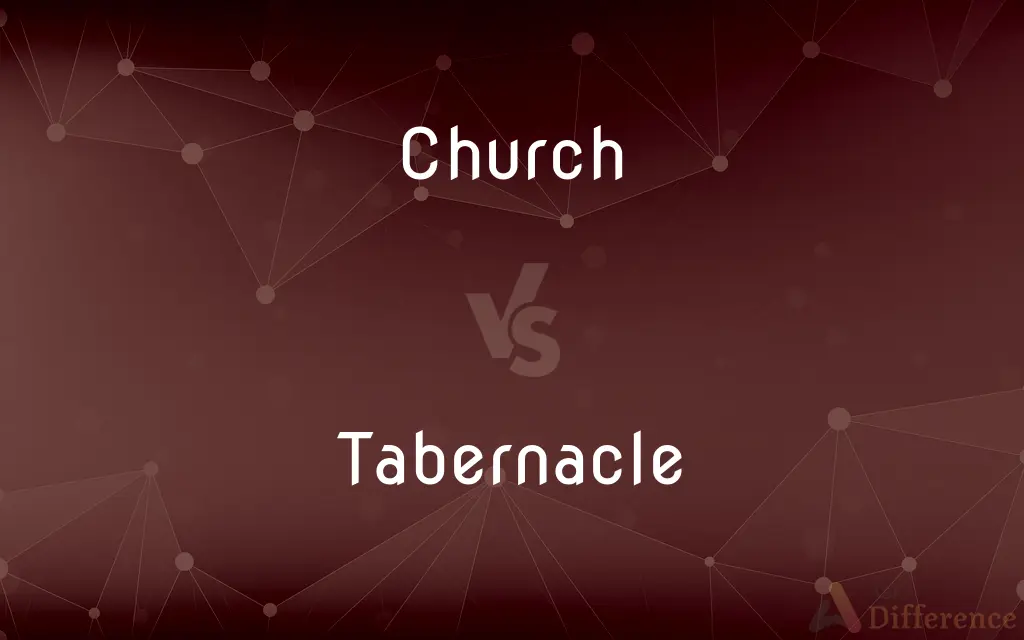Church vs. Tabernacle — What's the Difference?
Edited by Tayyaba Rehman — By Maham Liaqat — Updated on March 28, 2024
A church is a building for Christian worship, reflecting a wide range of architectural styles, while a tabernacle, in Christian context, is a box or case holding the Eucharist, or in the Old Testament, it refers to a portable sanctuary.

Difference Between Church and Tabernacle
Table of Contents
ADVERTISEMENT
Key Differences
A church is primarily a place of worship for Christians, designed to accommodate congregational gatherings, ceremonies, and prayers. Its architecture can vary from simple structures to grand cathedrals, often embodying significant cultural and historical values. Churches serve as central locations for community worship, spiritual growth, and religious education. On the other hand, a tabernacle has dual meanings depending on the context.
In the Christian liturgical context, it is a small box or receptacle designed to house the Eucharist, the consecrated bread and wine considered the body and blood of Christ, typically found within a church. This tabernacle is revered as a sacred object, signifying the presence of God. In the Old Testament, the Tabernacle refers to the portable earthly dwelling place for the divine presence, constructed by the Israelites under the direction of Moses. It was a complex structure with an outer courtyard, covered by a tent, housing the Ark of the Covenant.
While the church is a fixed architectural entity serving as a communal space for worship and religious activities, the tabernacle within Christian churches plays a specific role in the liturgical practice, symbolizing the divine presence and serving as a focal point for prayer and reverence. The Old Testament Tabernacle, conversely, represented God's itinerant dwelling among His people during their travels in the desert, emphasizing mobility and divine guidance.
Churches are ubiquitous across Christian denominations, with their design and functionality reflecting the theological and cultural traditions of their congregations. The concept of a church transcends its physical structure, often being equated with the Christian community itself. Meanwhile, the tabernacle in a church setting is a sacred fixture, its location and treatment governed by specific religious protocols, highlighting the sanctity of the Eucharist.
The distinction between a church and a tabernacle underscores the diversity of Christian worship practices and the rich symbolism embedded in religious artifacts and structures. The church facilitates communal worship and fellowship, while the tabernacle, whether in its portable Old Testament form or as a vessel for the Holy Eucharist, serves as a direct symbol of God's covenant and presence with His people.
ADVERTISEMENT
In summary, the church as a physical and communal entity offers a broad spectrum of religious and cultural expressions, while the tabernacle, in both its historical and contemporary manifestations, provides a focused representation of divine presence and the sacred.
Comparison Chart
Definition
A building for Christian worship and community activities.
A container for the Eucharist in Christian churches or the portable sanctuary in the Old Testament.
Context
Christian worship across various denominations.
Liturgical practices in Christianity; historical context in Judaism.
Significance
Serves as a communal space for worship and spiritual growth.
Symbolizes God's presence among His followers.
Architecture
Varies widely from simple structures to grand cathedrals.
A small, often ornate box or case in churches; a complex, portable structure in the Old Testament.
Usage
For congregational worship, ceremonies, and community gatherings.
Houses the Eucharist in Christian churches; served as a mobile dwelling place for God in the Old Testament.
Compare with Definitions
Church
A place for Christian congregational worship.
The community gathered at the church for Sunday service.
Tabernacle
A sacred container for the Eucharist.
The tabernacle on the altar holds the consecrated host.
Church
Centers for spiritual growth and community activities.
The church hosts weekly youth groups and choirs.
Tabernacle
Positioned in a prominent place within the church.
The golden tabernacle is the focal point of the chapel.
Church
Reflects a range of architectural styles.
The Gothic church stands as a landmark in the city.
Tabernacle
Treated with great reverence and care.
The priest approaches the tabernacle with solemnity during the Mass.
Church
Symbolizes the body of Christ and community of believers.
The church plays a crucial role in the spiritual life of its members.
Tabernacle
Symbolizes God's presence.
The light near the tabernacle signifies that God is with us.
Church
Often contains significant religious artifacts.
The church houses a centuries-old crucifix.
Tabernacle
In the Old Testament, the portable sanctuary.
The Tabernacle housed the Ark of the Covenant during the Israelites' desert wanderings.
Church
A building for public, especially Christian worship.
Tabernacle
According to the Hebrew Bible, the Tabernacle (Hebrew: מִשְׁכַּן, mishkān, meaning "residence" or "dwelling place"), also known as the Tent of the Congregation (אֹ֣הֶל מוֹעֵד֩ ’ōhel mō‘êḏ, also Tent of Meeting, etc.), was the portable earthly dwelling place of Yahweh (the God of Israel) used by the Israelites from the Exodus until the conquest of Canaan. Moses was instructed at Mount Sinai to construct and transport the tabernacle with the Israelites on their journey through the wilderness and their subsequent conquest of the Promised Land.
Church
The company of all Christians regarded as a spiritual body.
Tabernacle
Often Tabernacle(Bible) The portable sanctuary in which the Jews housed the Ark of the Covenant during their years in the desert.
Church
A specified Christian denomination
The Presbyterian Church.
Tabernacle
Often Tabernacle A case or box on a church altar containing the consecrated host and wine of the Eucharist.
Church
A congregation.
Tabernacle
A place of worship.
Church
Public divine worship in a church; a religious service
Goes to church at Christmas and Easter.
Tabernacle
A niche for a statue or relic.
Church
The clerical profession; clergy.
Tabernacle
(Nautical) A boxlike support in which the heel of a mast is stepped.
Church
Ecclesiastical power as distinguished from the secular
The separation of church and state.
Tabernacle
Any temporary dwelling; a hut, tent, or booth.
Church
To conduct a church service for, especially to perform a religious service for (a woman after childbirth).
Tabernacle
(Bible) The portable tent used before the construction of the temple, where the shekinah (presence of God) was believed to dwell.
Church
Of or relating to the church; ecclesiastical.
Tabernacle
(by extension) The Jewish Temple at Jerusalem (as continuing the functions of the earlier tabernacle).
Church
(countable) A Christian house of worship; a building where Christian religious services take place.
There is a lovely little church in the valley.
This building used to be a church before being converted into a library.
Tabernacle
Any portable shrine used in heathen or idolatrous worship.
Church
Christians collectively seen as a single spiritual community; Christianity; Christendom.
These worshippers make up the Church of Christ.
Tabernacle
A sukkah, the booth or 'tabernacle' used during the Jewish Feast of Sukkot.
Church
(countable) A local group of people who follow the same Christian religious beliefs, local or general.
Tabernacle
(Roman Catholicism) A small ornamented cupboard or box used for the reserved sacrament of the Eucharist, normally located in an especially prominent place in a church.
Church
(countable) A particular denomination of Christianity.
The Church of England separated from the Roman Catholic Church in 1534.
Tabernacle
A temporary place of worship, especially a tent, for a tent meeting, as with a venue for revival meetings.
Church
Christian worship held at a church; service.
Tabernacle
(by extension) Any house of worship, especially a Mormon church.
Church
Organized religion in general or a specific religion considered as a political institution.
Many constitutions enshrine the separation of church and state.
Tabernacle
(figuratively) Any abode or dwelling place, or especially the human body as the temporary dwelling place of the soul, or life.
Church
Any religious group.
She goes to a Wiccan church down the road.
Tabernacle
(nautical) A hinged device allowing for the easy folding of a mast 90 degrees from perpendicular, as for transporting the boat on a trailer, or passing under a bridge.
Church
Assembly.
Tabernacle
(intransitive) To dwell; to abide for a time.
Church
To conduct a religious service for (a woman after childbirth, or a newly married couple).
Tabernacle
A slightly built or temporary habitation; especially, a tent.
Dwelling in tabernacles with Isaac and Jacob.
Orange trees planted in the ground, and secured in winter with a wooden tabernacle and stoves.
Church
(transitive) To educate someone religiously, as in in a church.
Tabernacle
A portable structure of wooden framework covered with curtains, which was carried through the wilderness in the Israelitish exodus, as a place of sacrifice and worship.
Church
(slang) Expressing strong agreement.
- These burritos are the best!
- Church!
Tabernacle
Hence, the Jewish temple; sometimes, any other place for worship.
Church
A building set apart for Christian worship.
Tabernacle
Figuratively: The human body, as the temporary abode of the soul.
Shortly I must put off this my tabernacle.
Church
A Jewish or heathen temple.
Tabernacle
Any small cell, or like place, in which some holy or precious things was deposited or kept.
Church
A formally organized body of Christian believers worshiping together.
Tabernacle
The ornamental receptacle for the pyx, or for the consecrated elements, whether a part of a building or movable.
Church
A body of Christian believers, holding the same creed, observing the same rites, and acknowledging the same ecclesiastical authority; a denomination; as, the Roman Catholic church; the Presbyterian church.
Tabernacle
A boxlike step for a mast with the after side open, so that the mast can be lowered to pass under bridges, etc.
Church
The collective body of Christians.
Tabernacle
A niche for the image of a saint, or for any sacred painting or sculpture.
Church
Any body of worshipers; as, the Jewish church; the church of Brahm.
Tabernacle
Hence, a work of art of sacred subject, having a partially architectural character, as a solid frame resting on a bracket, or the like.
Church
The aggregate of religious influences in a community; ecclesiastical influence, authority, etc.; as, to array the power of the church against some moral evil.
Remember that both church and state are properly the rulers of the people, only because they are their benefactors.
Tabernacle
A tryptich for sacred imagery.
Church
To bless according to a prescribed form, or to unite with in publicly returning thanks in church, as after deliverance from the dangers of childbirth; as, the churching of women.
Tabernacle
A seat or stall in a choir, with its canopy.
Church
One of the groups of Christians who have their own beliefs and forms of worship
Tabernacle
To dwell or reside for a time; to be temporary housed.
He assumed our nature, and tabernacled among us in the flesh.
Church
A place for public (especially Christian) worship;
The church was empty
Tabernacle
The Mormon temple
Church
A service conducted in a church;
Don't be late for church
Tabernacle
(Judaism) a portable sanctuary in which the Jews carried the Ark of the Covenant on their exodus
Church
The body of people who attend or belong to a particular local church;
Our church is hosting a picnic next week
Tabernacle
(Judaism) the place of worship for a Jewish congregation
Church
Perform a special church rite or service for;
Church a woman after childbirth
Common Curiosities
What was the significance of the Old Testament Tabernacle?
The Old Testament Tabernacle was significant as a portable sanctuary that symbolized God's presence and guidance among the Israelites during their desert journeys.
How is the tabernacle used in a church service?
During a church service, the tabernacle is used to store the Eucharist, which may be accessed for communion or adoration, reflecting its role as a sacred object.
How does the architecture of a church influence its worship practices?
The architecture of a church can significantly influence worship practices by shaping the space's ambiance, acoustics, and capacity to accommodate liturgical activities and congregational participation.
Can non-Christians visit a church?
Yes, churches are often open to non-Christians, either as visitors interested in the architectural and cultural aspects or those seeking to learn about the Christian faith.
What is the primary purpose of a church?
The primary purpose of a church is to serve as a place for Christian worship, community gathering, and spiritual education.
Do all Christian denominations have a tabernacle in their churches?
While many Christian denominations have a tabernacle in their churches, especially those that practice the Eucharist, its presence and specific practices around it may vary among different traditions.
Is the tabernacle always located at the altar in a church?
While the tabernacle is often located at or near the altar in many churches, its exact placement can vary based on denominational traditions and the architectural design of the church.
What does the tabernacle symbolize in Christianity?
In Christianity, the tabernacle symbolizes God's presence among His people, particularly through the housing of the Eucharist.
What materials are used to make a tabernacle?
Tabernacles are often made from metals such as gold, silver, or bronze and may be adorned with jewels, engravings, or religious symbols to reflect their sacred purpose.
How did the concept of the church evolve over time?
The concept of the church has evolved from early Christian gatherings in homes to the establishment of dedicated buildings for worship, reflecting changes in liturgical practices, artistic expressions, and community needs throughout history.
Share Your Discovery

Previous Comparison
Replica vs. Replicant
Next Comparison
Gather vs. GroupAuthor Spotlight
Written by
Maham LiaqatEdited by
Tayyaba RehmanTayyaba Rehman is a distinguished writer, currently serving as a primary contributor to askdifference.com. As a researcher in semantics and etymology, Tayyaba's passion for the complexity of languages and their distinctions has found a perfect home on the platform. Tayyaba delves into the intricacies of language, distinguishing between commonly confused words and phrases, thereby providing clarity for readers worldwide.
















































